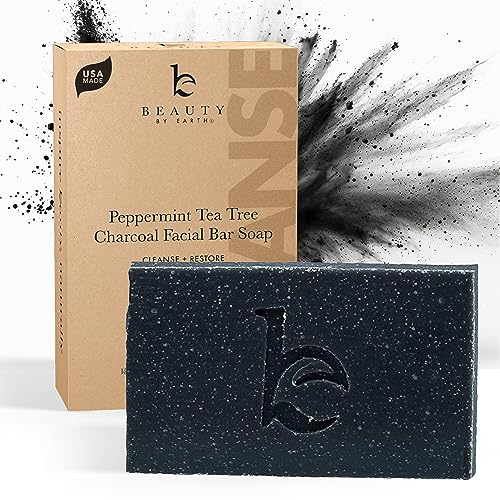
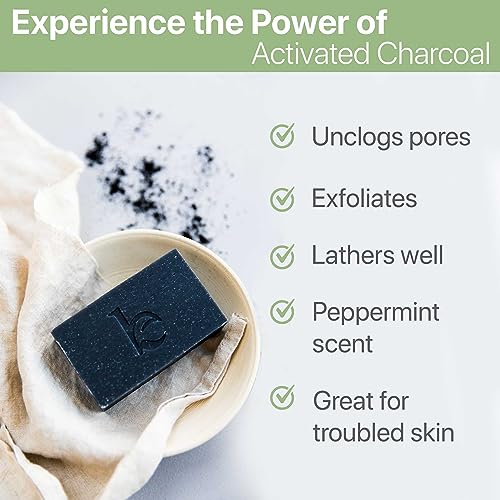
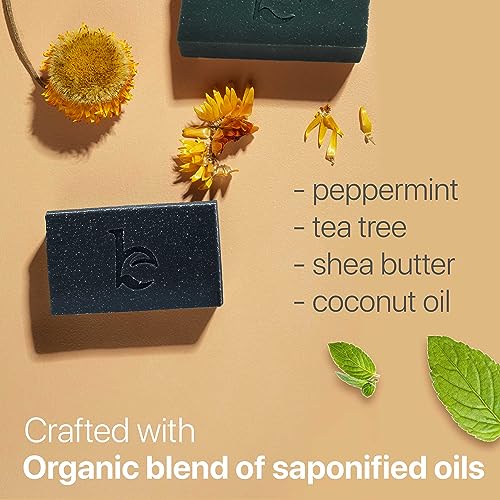
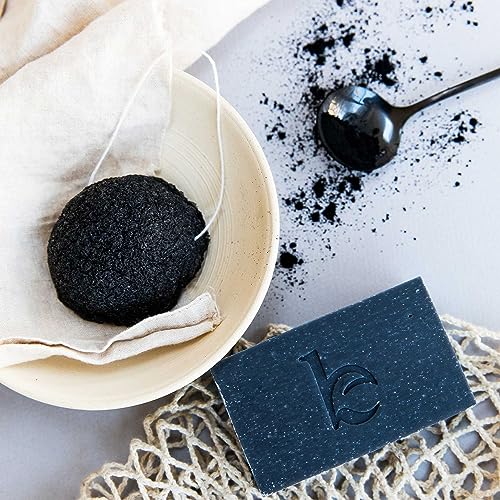

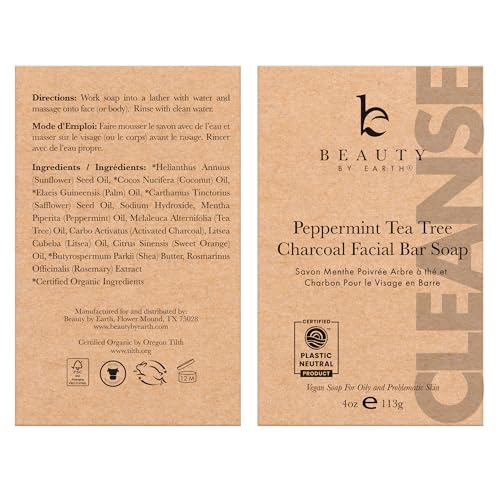
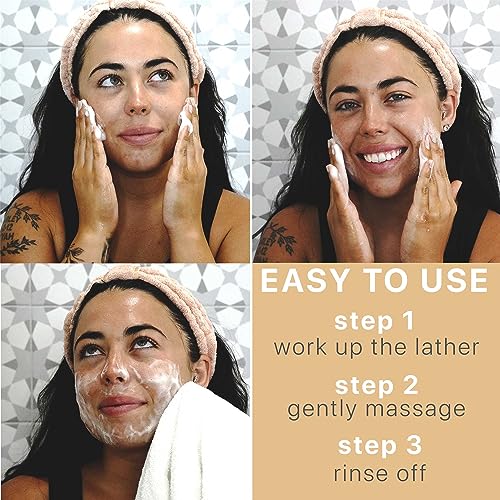
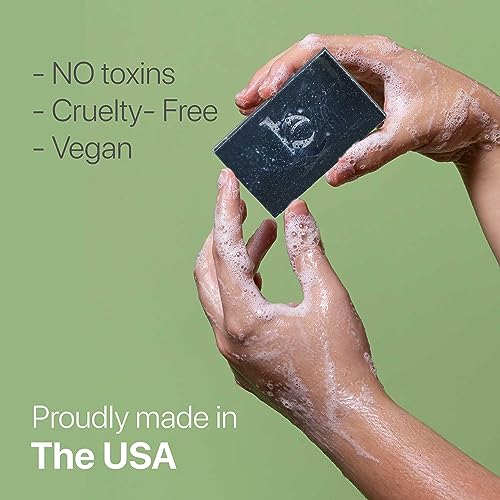
Beauty by Earth Charcoal Face Wash Bar - Deep Detox, Natural Ingredients, 4oz


Mentha Piperita (Peppermint) Oil
High RiskMentha piperita (peppermint) oil is a volatile oil extracted from the leaves of the peppermint plant, known for its strong aroma and flavor. It is commonly used in cosmetics and personal care products for its cooling properties and fragrance enhancement.
Sustai Insights
Peppermint oil offers functional benefits such as antimicrobial properties and a soothing sensation on the skin. However, it is associated with a high potential for allergies and skin irritation. Regulatory bodies impose certain restrictions on its use due to these concerns. The overall risk level is assessed as high, warranting caution in usage, especially for sensitive populations. Alternatives like spearmint oil may provide similar benefits with potentially lower irritation risks.
Citrus Aurantium Dulcis (Orange) Oil
Medium RiskCitrus aurantium dulcis (orange) oil is a volatile oil extracted from the fresh peel of oranges. It is commonly used in cosmetic and personal care products for its fragrance and potential skin benefits.
Sustai Insights
Citrus aurantium dulcis (orange) oil offers functional benefits as a natural fragrance and may provide skin conditioning effects. However, it has a high allergenic potential, posing risks of skin irritation and allergic reactions. Environmental concerns include moderate persistence and potential bioaccumulation. Regulatory bodies may impose usage restrictions, indicating a medium overall risk level. For safe use, it's advisable to patch test and consider alternatives like other citrus oils or synthetic fragrances to mitigate allergy risks.
Melaleuca Alternifolia (Tea Tree) Leaf Oil
Medium RiskMelaleuca alternifolia (tea tree) leaf oil is derived from the leaves of the Melaleuca alternifolia tree. It is commonly used in personal care products for its antiseptic and antimicrobial properties, making it a popular ingredient for skincare formulations.
Sustai Insights
Tea tree leaf oil offers functional benefits, including antimicrobial properties that can help with skin conditions. However, it has a high allergenic potential and may cause skin irritation or allergic reactions in sensitive individuals. Additionally, while it poses low to moderate risks concerning endocrine disruption and reproductive toxicity, it is restricted in certain formulations. Overall, the ingredient is assessed as medium risk, necessitating careful usage and consideration of alternatives for sensitive populations.
Litsea Cubeba (May Chang) Oil
Medium RiskLitsea cubeba (May Chang) oil is a volatile oil derived from the fruit of the Litsea cubeba plant, commonly used for its aromatic properties and as a natural fragrance in cosmetic and personal care products.
Sustai Insights
Litsea cubeba oil offers functional benefits, primarily as a natural fragrance and potential antimicrobial agent. It is sustainably sourced and biodegradable. However, it poses moderate allergy risks and may cause skin irritation in sensitive individuals. Environmental concerns include potential pollutant effects and bioaccumulation. Regulatory bodies have noted restrictions on its use in specific products. Overall, the risk associated with Litsea cubeba oil is assessed as medium, necessitating cautious usage and consideration of safer alternatives when possible.
Carthamus Tinctorius (Safflower) Seed Oil
Low RiskCarthamus tinctorius (safflower) seed oil is derived from the seeds of the safflower plant. It is primarily used in cosmetic formulations for its emollient properties, helping to moisturize and soften the skin. The oil is rich in unsaturated fatty acids and is often employed in skin care products for its potential benefits to skin health.
Sustai Insights
Safflower seed oil offers functional benefits as a moisturizer and emollient, contributing to skin hydration without significant irritation. It is generally recognized as low risk concerning health impacts, with minimal concerns over carcinogenicity, allergies, and reproductive toxicity. Environmentally, it poses low risks, being non-bioaccumulative and not a significant pollutant. Regulatory bodies do not impose restrictions on its use, underscoring its safety profile. While there are no widely recognized safer alternatives, users should ensure proper application to mitigate any potential skin irritation. Overall, this ingredient is assessed as low risk.
Elaeis Guineensis (Palm) Kernel Oil
Low RiskElaeis guineensis (palm) kernel oil is an oil derived from the seeds of the African oil palm tree. It functions primarily as an emollient and moisturizing agent in cosmetic formulations, enhancing texture and providing moisture retention.
Sustai Insights
Elaeis guineensis (palm) kernel oil offers functional benefits as a moisturizing agent and is often sustainably sourced. Health risks are low, with minimal concerns regarding carcinogenicity, allergies, or reproductive toxicity. Environmental risks appear low, with no significant pollutant or bioaccumulation issues reported. Regulatory bodies impose few restrictions, suggesting overall low risk. Safe usage practices recommend using it within established concentrations, while alternatives such as coconut oil may be considered for similar functions. Overall, this ingredient presents a low risk profile.
Activated Charcoal
Low RiskActivated charcoal is a dried, carbonaceous material known for its porous structure, primarily used in personal care and medical products for its adsorptive properties. It effectively binds to impurities and toxins, aiding in detoxification and cleansing processes.
Sustai Insights
Activated charcoal offers functional benefits such as effective adsorption of toxins and impurities, contributing to its use in various products, while being biodegradable and potentially sustainably sourced. Health risks are minimal, with low concerns regarding carcinogenicity, allergies, or reproductive toxicity. Environmental risks are also low, as it does not significantly contribute to pollution or bioaccumulation. Regulatory bodies have not issued warnings against its use, indicating low risk overall. Safe usage practices include ensuring proper formulation concentrations. While alternatives exist, activated charcoal remains a low-risk choice for consumers.
Cocos Nucifera (Coconut) Oil
Low RiskCocos Nucifera (Coconut) Oil is derived from the kernels of the coconut palm. It is primarily used in cosmetic formulations for its emollient and moisturizing properties, making it suitable for skin and hair care products.
Sustai Insights
Coconut oil serves as an effective moisturizer and emollient, promoting skin hydration and softness. It is sustainably sourced and biodegradable. Health risks are minimal, with low concerns regarding carcinogenicity, allergens, and reproductive toxicity. Environmental impact is also low, as it does not contribute significantly to pollution or bioaccumulation. Regulatory bodies have not issued restrictions on its use. Overall, coconut oil presents a low risk for health and environmental concerns, making it a safe ingredient in cosmetic products.
Butyrospermum Parkii (Shea) Butter
Low RiskButyrospermum parkii (shea) butter is a vegetable fat derived from the nuts of the shea tree. It is commonly used in cosmetic formulations for its emollient properties, providing moisture and improving skin texture. Additionally, shea butter is known for its ability to enhance the stability of products and deliver a creamy texture.
Sustai Insights
Shea butter offers functional benefits as an effective moisturizer, enhancing skin barrier function and texture. It is sustainably sourced and biodegradable, contributing to eco-friendliness. Health-wise, it is associated with low risks for carcinogenicity, allergies, and reproductive toxicity. Environmental impacts are minimal, with no significant pollutant potential identified. Regulatory assessments indicate no current restrictions. Overall, the ingredient presents a low risk, making it a favorable choice in cosmetic formulations.
Helianthus Annuus (Sunflower) Seed Oil
Low RiskHelianthus annuus (sunflower) seed oil is derived from the seeds of the sunflower plant. It serves primarily as an emollient and moisturizer in cosmetic formulations, helping to maintain skin hydration and improve texture.
Sustai Insights
Sunflower seed oil is effective as an emollient, providing moisture and improving skin texture while being biodegradable and sustainably sourced. It poses low health risks, including negligible concerns for carcinogenicity, allergies, or reproductive toxicity. Environmentally, it does not significantly contribute to pollution or bioaccumulation. Regulatory bodies currently do not list any advisories for this ingredient. Overall, it is assessed as low risk, with safe usage practices recommended. Alternatives include oils like jojoba or almond oil for those seeking different properties.
Carthamus Tinctorius (Safflower) Seed Oil
Low RiskCarthamus tinctorius (safflower) seed oil is derived from the seeds of the safflower plant. It is primarily used in cosmetic formulations for its emollient properties, helping to moisturize and soften the skin. The oil is rich in unsaturated fatty acids and is often employed in skin care products for its potential benefits to skin health.
Sustai Insights
Safflower seed oil offers functional benefits as a moisturizer and emollient, contributing to skin hydration without significant irritation. It is generally recognized as low risk concerning health impacts, with minimal concerns over carcinogenicity, allergies, and reproductive toxicity. Environmentally, it poses low risks, being non-bioaccumulative and not a significant pollutant. Regulatory bodies do not impose restrictions on its use, underscoring its safety profile. While there are no widely recognized safer alternatives, users should ensure proper application to mitigate any potential skin irritation. Overall, this ingredient is assessed as low risk.
Mentha Piperita (Peppermint) Oil
High RiskMentha piperita (peppermint) oil is a volatile oil extracted from the leaves of the peppermint plant, known for its strong aroma and flavor. It is commonly used in cosmetics and personal care products for its cooling properties and fragrance enhancement.
Sustai Insights
Peppermint oil offers functional benefits such as antimicrobial properties and a soothing sensation on the skin. However, it is associated with a high potential for allergies and skin irritation. Regulatory bodies impose certain restrictions on its use due to these concerns. The overall risk level is assessed as high, warranting caution in usage, especially for sensitive populations. Alternatives like spearmint oil may provide similar benefits with potentially lower irritation risks.
Elaeis Guineensis (Palm) Kernel Oil
Low RiskElaeis guineensis (palm) kernel oil is an oil derived from the seeds of the African oil palm tree. It functions primarily as an emollient and moisturizing agent in cosmetic formulations, enhancing texture and providing moisture retention.
Sustai Insights
Elaeis guineensis (palm) kernel oil offers functional benefits as a moisturizing agent and is often sustainably sourced. Health risks are low, with minimal concerns regarding carcinogenicity, allergies, or reproductive toxicity. Environmental risks appear low, with no significant pollutant or bioaccumulation issues reported. Regulatory bodies impose few restrictions, suggesting overall low risk. Safe usage practices recommend using it within established concentrations, while alternatives such as coconut oil may be considered for similar functions. Overall, this ingredient presents a low risk profile.
Citrus Aurantium Dulcis (Orange) Oil
Medium RiskCitrus aurantium dulcis (orange) oil is a volatile oil extracted from the fresh peel of oranges. It is commonly used in cosmetic and personal care products for its fragrance and potential skin benefits.
Sustai Insights
Citrus aurantium dulcis (orange) oil offers functional benefits as a natural fragrance and may provide skin conditioning effects. However, it has a high allergenic potential, posing risks of skin irritation and allergic reactions. Environmental concerns include moderate persistence and potential bioaccumulation. Regulatory bodies may impose usage restrictions, indicating a medium overall risk level. For safe use, it's advisable to patch test and consider alternatives like other citrus oils or synthetic fragrances to mitigate allergy risks.
Activated Charcoal
Low RiskActivated charcoal is a dried, carbonaceous material known for its porous structure, primarily used in personal care and medical products for its adsorptive properties. It effectively binds to impurities and toxins, aiding in detoxification and cleansing processes.
Sustai Insights
Activated charcoal offers functional benefits such as effective adsorption of toxins and impurities, contributing to its use in various products, while being biodegradable and potentially sustainably sourced. Health risks are minimal, with low concerns regarding carcinogenicity, allergies, or reproductive toxicity. Environmental risks are also low, as it does not significantly contribute to pollution or bioaccumulation. Regulatory bodies have not issued warnings against its use, indicating low risk overall. Safe usage practices include ensuring proper formulation concentrations. While alternatives exist, activated charcoal remains a low-risk choice for consumers.
Melaleuca Alternifolia (Tea Tree) Leaf Oil
Medium RiskMelaleuca alternifolia (tea tree) leaf oil is derived from the leaves of the Melaleuca alternifolia tree. It is commonly used in personal care products for its antiseptic and antimicrobial properties, making it a popular ingredient for skincare formulations.
Sustai Insights
Tea tree leaf oil offers functional benefits, including antimicrobial properties that can help with skin conditions. However, it has a high allergenic potential and may cause skin irritation or allergic reactions in sensitive individuals. Additionally, while it poses low to moderate risks concerning endocrine disruption and reproductive toxicity, it is restricted in certain formulations. Overall, the ingredient is assessed as medium risk, necessitating careful usage and consideration of alternatives for sensitive populations.
Litsea Cubeba (May Chang) Oil
Medium RiskLitsea cubeba (May Chang) oil is a volatile oil derived from the fruit of the Litsea cubeba plant, commonly used for its aromatic properties and as a natural fragrance in cosmetic and personal care products.
Sustai Insights
Litsea cubeba oil offers functional benefits, primarily as a natural fragrance and potential antimicrobial agent. It is sustainably sourced and biodegradable. However, it poses moderate allergy risks and may cause skin irritation in sensitive individuals. Environmental concerns include potential pollutant effects and bioaccumulation. Regulatory bodies have noted restrictions on its use in specific products. Overall, the risk associated with Litsea cubeba oil is assessed as medium, necessitating cautious usage and consideration of safer alternatives when possible.
Cocos Nucifera (Coconut) Oil
Low RiskCocos Nucifera (Coconut) Oil is derived from the kernels of the coconut palm. It is primarily used in cosmetic formulations for its emollient and moisturizing properties, making it suitable for skin and hair care products.
Sustai Insights
Coconut oil serves as an effective moisturizer and emollient, promoting skin hydration and softness. It is sustainably sourced and biodegradable. Health risks are minimal, with low concerns regarding carcinogenicity, allergens, and reproductive toxicity. Environmental impact is also low, as it does not contribute significantly to pollution or bioaccumulation. Regulatory bodies have not issued restrictions on its use. Overall, coconut oil presents a low risk for health and environmental concerns, making it a safe ingredient in cosmetic products.
Butyrospermum Parkii (Shea) Butter
Low RiskButyrospermum parkii (shea) butter is a vegetable fat derived from the nuts of the shea tree. It is commonly used in cosmetic formulations for its emollient properties, providing moisture and improving skin texture. Additionally, shea butter is known for its ability to enhance the stability of products and deliver a creamy texture.
Sustai Insights
Shea butter offers functional benefits as an effective moisturizer, enhancing skin barrier function and texture. It is sustainably sourced and biodegradable, contributing to eco-friendliness. Health-wise, it is associated with low risks for carcinogenicity, allergies, and reproductive toxicity. Environmental impacts are minimal, with no significant pollutant potential identified. Regulatory assessments indicate no current restrictions. Overall, the ingredient presents a low risk, making it a favorable choice in cosmetic formulations.
Helianthus Annuus (Sunflower) Seed Oil
Low RiskHelianthus annuus (sunflower) seed oil is derived from the seeds of the sunflower plant. It serves primarily as an emollient and moisturizer in cosmetic formulations, helping to maintain skin hydration and improve texture.
Sustai Insights
Sunflower seed oil is effective as an emollient, providing moisture and improving skin texture while being biodegradable and sustainably sourced. It poses low health risks, including negligible concerns for carcinogenicity, allergies, or reproductive toxicity. Environmentally, it does not significantly contribute to pollution or bioaccumulation. Regulatory bodies currently do not list any advisories for this ingredient. Overall, it is assessed as low risk, with safe usage practices recommended. Alternatives include oils like jojoba or almond oil for those seeking different properties.
Experience the refreshing power of the Beauty by Earth Charcoal Face Wash Bar Soap, designed for oily and blemish-prone skin. This peppermint-infused cleanser not only detoxifies but also hydrates, making it the perfect addition to your daily skincare routine.
- Deep Detox: Effectively removes impurities and hydrates skin, suitable for men, women, and teens of all skin types.
- Blemish Control: Helps clear blackheads and dead skin cells naturally, allowing your skin’s natural glow to shine.
- Natural Ingredients: Crafted with organic Peppermint and Tea Tree Oils, along with Shea Butter, this soap is free from harsh chemicals, sulfates, and parabens.
- Handmade in the USA: Produced in small batches, cruelty-free, ensuring quality and ethical practices in every bar.
- Satisfaction Guaranteed: Enjoy a worry-free purchase with a full refund policy if you’re not completely satisfied.
Subscribe & Save with Sustai
- Best Price Guarantee: Always enjoy the lowest prices on sustainable home essentials.
- No Surprises: We’ll notify you before shipping. No hidden fees, ever.
- You’re in Charge: Change, pause, or cancel your subscription anytime with ease.
- Eco-Friendly Deliveries: Our grouped shipments mean less packaging and lower emissions.
Join us on a sustainable journey. Special offers for a limited time! Prices and promotions may change.
Recommended Products
Experience the refreshing power of the Beauty by Earth Charcoal Face Wash Bar Soap, designed for oily and blemish-prone skin. This peppermint-infused cleanser not only detoxifies but also hydrates, making it the perfect addition to your daily skincare routine.
- Deep Detox: Effectively removes impurities and hydrates skin, suitable for men, women, and teens of all skin types.
- Blemish Control: Helps clear blackheads and dead skin cells naturally, allowing your skin’s natural glow to shine.
- Natural Ingredients: Crafted with organic Peppermint and Tea Tree Oils, along with Shea Butter, this soap is free from harsh chemicals, sulfates, and parabens.
- Handmade in the USA: Produced in small batches, cruelty-free, ensuring quality and ethical practices in every bar.
- Satisfaction Guaranteed: Enjoy a worry-free purchase with a full refund policy if you’re not completely satisfied.

You can have at most 2 Sustainable Steals products in your cart
Customer Reviews
Customers’ View
Customers appreciate the effectiveness and natural formulation of this face wash bar, particularly its purifying properties and pleasant scent. Many users note that it provides a deep clean for oily skin without stripping moisture, leaving their faces feeling refreshed and smooth. The combination of peppermint and tea tree oils is frequently highlighted for its invigorating and soothing effects, with remarks like, 'My skin feels refreshed and clean... without leaving it dry.' Additionally, customers value the product's handmade quality and cruelty-free commitment, aligning with their eco-conscious values. While some express a desire for more environmentally friendly packaging, overall, users find this product effective and supportive of their skin care regimen.
AI-generated from the text of customer reviewsThis product is rated 5.0 of 5.0 stars.
It has received 2 reviews.




